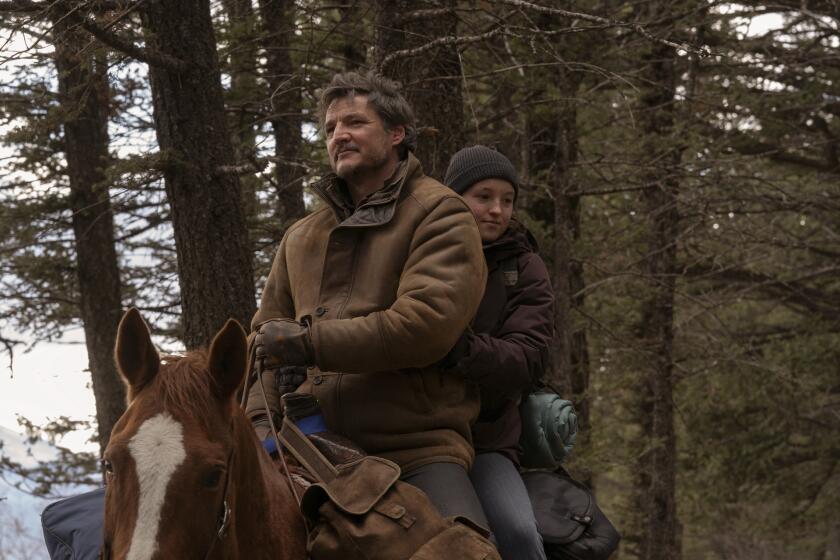Book review: ‘Unreal Estate’ by Michael Gross
- Share via
We’ve heard it before — Americans don’t like to read, they just want to ogle celebrities and watch shows about houses on TV. So how about a book that allows the reader to ogle celebrities and their homes to bring them back to reading? That’s just what Michael Gross has provided in “Unreal Estate: Money, Ambition and the Lust for Land in Los Angeles,” which chronicles the history of L.A.’s biggest mansions and the people who have inhabited them over the last century.
Gross’ subjects are A-list characters out of the city’s history, like oil man Edward Doheny, who fell in love with the voice of a telephone operator and married her in his private railroad car, then went on to build the mansion Greystone for his son and his family. Starlet Marilyn Monroe makes an appearance too; she carried on an affair with movie mogul Joe Schenck in a house that was later occupied by Tony Curtis and then Cher.
Gross focuses on residences in the “Platinum Triangle,” the area that encompasses Bel-Air, Beverly Hills and Holmby Hills. It can sometimes read like real estate porn, with paragraphs of jaw-dropping details about a type of extravagance that might have been scorned even by the very wealthy on the Titanic. But he also leaves the reader with a sense of history; we see the oil barons move in, then the overspending businessmen of the Roaring Twenties, the drugs and sexual liberation of the 1970s, and the extreme wealth that came during the Reagan era and still exists today. And there goes the neighborhood.
It should be of no surprise that from the very start, those with the cash to build opulent homes like Greystone, replete with gift-wrapping rooms, floor to ceiling murals and a barber chair installed in a black marble bathroom, also cycled through despair, divorce, bankruptcy and suicide. They weren’t just celebrities, either, Alphonzo Bell, the founder of Bel-Air, reportedly refused to sell a home to a cowboy star, saying “I’ve made a law — not one acre of my land is to be sold to actors or Jews.”
For some residents, it was the homes, and not any other accomplishment, that made them the kind of celebrities best suited for an “E! True Hollywood Story.” If only E! had existed in 1938, when onetime nurse Hilda Olsen Boldt Weber, the wife of a millionaire bottle manufacturer whom she had nursed back to health, completed a 35,000-square-foot mansion that had marble floors throughout, five kitchens and 12 servant bedrooms. She entertained but was never respected, Gross says, and when the house became too expensive for even a millionaire bottle maker, she sold it. Hilda gambled away her sorrow, later committing suicide with a bottle of sleeping pills in Santa Barbara.
When celebrities did arrive in the neighborhood, they brought with them the self-destruction and just plain weirdness we’ve come to expect from the rich and famous. Gross uses their homes as an excuse to air their dirty laundry. He observes that Conrad Hilton, who married and divorced Zsa Zsa Gabor, moved into a mansion where he and his family ate off solid gold plates and “belched and farted audibly.” And billionaire David Murdock, who lived in what was once the Hilton house, had a son who “passed through a phase in his late 20s and early 30s during which he performed at Los Angeles clubs as Eliphas Horn, the black-caped devilish half-beast front man of a goth band.”
As more actors and writers moved into the neighborhood and magazines touted their glamorous lifestyles, many of Gross’ subjects concluded that owning a glitzy Los Angeles mansion was a way to attain a successful entertainment career, not the result of one. Not surprisingly, those investments rarely worked out. Take the case of actress Jayne Mansfield, who married Mickey Hargitay, a former Mr. Universe from Budapest, bought a mansion and painted it pink. Her husband installed pink shag carpets, a white marble fountain “that sometimes spouted champagne” and a heart-shaped swimming pool, gardens and fireplace mantle. The couple went through a sordid divorce and Mansfield died in Mississippi when the car she was riding in crashed into a truck spraying mosquito repellent (her daughter, the actress Mariska Hargitay, was in the back seat and unhurt). It took more than a year to sell the house, which was infested with rats.
Gross’ attention to detail about humans and their homes should make you want to pick up “Unreal Estate,” which might be best described as what would happen if Us Weekly and Architectural Digest had a love child that was much smarter than either. The book provides a panorama of what was going on inside some of the most frivolous, gated houses on a hill that have ever existed; the only thing it lacks is a map of each home’s location so we can go see them for ourselves. Gross’ conclusions may not be jaw-dropping, but that’s not a bad thing: He argues that the very spirit of the millions of people who have come west seeking fame and fortune resides today in the Platinum Triangle, where there is no such thing as too much.
More to Read
The biggest entertainment stories
Get our big stories about Hollywood, film, television, music, arts, culture and more right in your inbox as soon as they publish.
You may occasionally receive promotional content from the Los Angeles Times.











